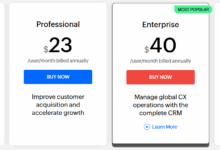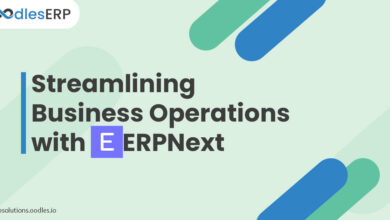Top Cloud-Based CRM Platforms: Streamlining Business Operations With Ease
Top Cloud-Based CRM Platforms take center stage, offering businesses a seamless way to manage customer relationships and boost efficiency. In a world where digital solutions reign supreme, these platforms provide a glimpse into the future of customer management.
In this guide, we delve into the key features, benefits, and popular platforms in the market, shedding light on how cloud-based CRM systems revolutionize the way businesses interact with their customers.
Overview of Top Cloud-Based CRM Platforms
Cloud-based CRM platforms are systems that store and manage customer data in the cloud, providing businesses with access to important information from anywhere with an internet connection. Unlike traditional CRM systems that require on-premise hardware and software, cloud-based CRM platforms offer a more flexible and scalable solution. Some popular cloud-based CRM platforms in the market include Salesforce, HubSpot, and Zoho CRM. These platforms provide businesses with the ability to scale their CRM operations according to their needs, catering to businesses of all sizes.
Key Features of Cloud-Based CRM Platforms
- Sales Automation: Automate sales processes, track leads, and manage pipelines efficiently.
- Marketing Automation: Create targeted marketing campaigns, track ROI, and analyze customer behavior.
- Customer Service: Provide excellent customer support through ticketing systems, live chat, and self-service portals.
Cloud-based CRM platforms offer extensive customization options, allowing businesses to tailor the system to meet their specific requirements. Integration with other software applications is achieved through APIs and connectors, streamlining processes and ensuring data consistency across different platforms.
Benefits of Using Cloud-Based CRM Platforms
- Cost-Saving Advantages: Implementing a cloud-based CRM system eliminates the need for expensive hardware and maintenance costs associated with on-premise solutions.
- Accessibility Benefits: Cloud-based CRM platforms can be accessed from anywhere, making them ideal for remote and mobile teams to collaborate effectively.
- Data Security and Compliance: Cloud-based CRM platforms implement robust security measures to protect sensitive customer data and ensure compliance with regulations like GDPR.
Salesforce CRM
Salesforce CRM is a cloud-based customer relationship management platform that offers a wide range of functionalities to help businesses manage their customer interactions effectively. It provides tools for sales, marketing, customer service, and analytics, all in one integrated platform.
Comparison with other cloud-based CRM platforms
When compared to other cloud-based CRM platforms, Salesforce CRM stands out for its robust features and flexibility. It offers a highly customizable interface, extensive integration options with third-party applications, and a strong focus on artificial intelligence and automation. Additionally, Salesforce CRM has a large community of developers and users, providing a wealth of resources and support.
Customization options in Salesforce CRM
- Salesforce CRM allows users to customize their workflows, processes, and data fields to align with their specific business needs.
- Users can create custom reports and dashboards to track key performance metrics and gain insights into their sales and marketing activities.
- The platform offers a wide range of app extensions and integrations through the Salesforce AppExchange, allowing users to enhance their CRM experience with additional functionalities.
- With the Salesforce Einstein AI capabilities, users can leverage predictive analytics and machine learning to optimize their sales and marketing strategies.
HubSpot CRM
HubSpot CRM is a popular cloud-based customer relationship management platform that offers a wide range of features to help businesses effectively manage their customer interactions and improve sales processes.
Key Features of HubSpot CRM:
- Customer Database: HubSpot CRM provides a centralized database where you can store and manage all customer information, including contact details, communication history, and interaction notes.
- Sales Pipeline Management: The platform allows you to track and manage your sales pipeline, from initial contact to deal closure, with customizable stages and deal tracking.
- Email Integration: HubSpot CRM seamlessly integrates with your email provider, allowing you to track email opens, clicks, and responses directly within the platform.
- Lead Scoring: You can set up lead scoring criteria to prioritize leads based on their interactions with your business, helping your sales team focus on high-value prospects.
- Reporting and Analytics: HubSpot CRM offers robust reporting and analytics tools to track key performance metrics, monitor sales activities, and generate insightful reports for data-driven decision-making.
Pricing Structure of HubSpot CRM:
HubSpot CRM offers a free version with basic features, making it an attractive option for small businesses and startups. For more advanced capabilities, you can upgrade to the paid Marketing Hub, Sales Hub, or Service Hub, which offer additional features and functionalities at different price points based on your business needs.
Integration Capabilities of HubSpot CRM:
HubSpot CRM integrates seamlessly with a wide range of popular tools and platforms, including email marketing software, social media platforms, e-commerce solutions, and customer service applications. This allows you to streamline workflows, improve data synchronization, and enhance overall efficiency by connecting HubSpot CRM with your existing tech stack.
Zoho CRM
Zoho CRM is a cloud-based customer relationship management platform that offers a wide range of features to help businesses manage their customer interactions effectively. With its intuitive interface and customizable options, Zoho CRM has become a popular choice for companies looking to streamline their sales and marketing processes.
Unique Selling Points of Zoho CRM
- Customizable Modules: Zoho CRM allows users to create custom modules to fit their specific business needs, providing flexibility and scalability.
- Automation and Workflow Management: Zoho CRM offers automation features to streamline repetitive tasks and improve efficiency in sales and marketing processes.
- Integration Capabilities: Zoho CRM integrates seamlessly with other Zoho applications as well as third-party software, allowing for a more comprehensive view of customer data.
Comparison with Salesforce CRM in Terms of Features
| Zoho CRM | Salesforce CRM |
|---|---|
| Customizable Modules | Also offers customizable modules, but may require more technical expertise. |
| Automation and Workflow Management | Both platforms offer automation features, but Zoho CRM’s interface may be more user-friendly for beginners. |
| Integration Capabilities | While both platforms support integrations, Zoho CRM’s seamless integration with Zoho applications gives it an edge in terms of connectivity. |
User Interface and Ease of Use in Zoho CRM
Zoho CRM boasts a clean and intuitive user interface that makes it easy for users to navigate through different modules and features. The drag-and-drop customization options make it simple to tailor the platform to specific business needs without requiring extensive technical knowledge. Overall, Zoho CRM’s user-friendly design contributes to a seamless user experience for businesses of all sizes.
Microsoft Dynamics 365
Microsoft Dynamics 365 is a cloud-based CRM platform developed by Microsoft that combines various business applications to streamline processes and improve customer relationships. It offers modules for sales, customer service, marketing, field service, and more, all integrated into one platform.
Integration with Other Microsoft Products
Microsoft Dynamics 365 seamlessly integrates with other Microsoft products such as Office 365, Outlook, SharePoint, and Teams. This integration ensures a smooth flow of data between different applications, allowing users to work efficiently without the need for manual data entry or switching between multiple platforms.
Scalability Options
Microsoft Dynamics 365 provides scalable options that allow businesses to adjust their CRM system according to their changing needs. Whether a company is a small business or a large enterprise, Dynamics 365 offers flexibility in adding or removing users, customizing workflows, and expanding functionalities as the business grows.
Key Features of Sales Module
- Lead and Opportunity Management
- Sales Forecasting
- Customer Insights and Analytics
- Sales Performance Dashboards
- Integration with LinkedIn Sales Navigator
Pricing Plans
Microsoft Dynamics 365 offers various pricing plans tailored to different business needs, such as Sales, Customer Service, Field Service, and Marketing. The pricing plans vary in features, functionalities, and user limits, catering to businesses of all sizes. Businesses can choose the plan that best suits their requirements and budget.
Customizing Dashboards
To customize dashboards in Microsoft Dynamics 365, follow these steps:
- Go to the Dynamics 365 homepage and select the Sales module.
- Click on the Dashboards tab and choose the dashboard you want to customize.
- Click on the Edit button to modify the layout, add new charts, or rearrange existing elements.
- Save your changes and publish the dashboard for users to view the updated version.
Integrating with Third-Party Applications
Integrating Microsoft Dynamics 365 with third-party applications involves utilizing connectors or APIs to establish a seamless flow of data between the CRM platform and external systems. Businesses can leverage integration tools provided by Microsoft or third-party integration platforms to connect Dynamics 365 with applications such as accounting software, marketing automation tools, or e-commerce platforms.
Pipedrive
Pipedrive is a cloud-based CRM platform that is specifically designed for sales teams and small businesses looking to streamline their sales processes and improve efficiency.
Target Market for Pipedrive
Pipedrive primarily targets small to medium-sized businesses that rely heavily on sales as part of their operations. It is ideal for teams looking to manage their sales pipeline effectively and increase their conversion rates.
Pipeline Management Features of Pipedrive
- Pipedrive offers a visual sales pipeline that allows users to easily track their deals and progress through the sales process.
- Users can customize their pipeline stages to fit their specific sales process and workflows.
- The platform provides automation features to help streamline repetitive tasks and ensure no deals fall through the cracks.
- Pipedrive also offers integrations with other tools and applications to enhance pipeline management.
Reporting and Analytics Capabilities of Pipedrive
- Pipedrive provides detailed reports and dashboards that give users insights into their sales performance and team productivity.
- Users can track key performance indicators (KPIs) such as deal win rates, sales cycle length, and revenue forecasts.
- The platform offers customizable reports to meet specific business needs and goals.
- Pipedrive’s analytics tools help users make data-driven decisions to improve sales strategies and drive growth.
Freshworks CRM
Freshworks CRM is a cloud-based customer relationship management platform that helps businesses manage their sales, marketing, and customer support processes efficiently.
Setting up Email Automation in Freshworks CRM
To set up email automation in Freshworks CRM, follow these steps:
- Go to the Automations tab in Freshworks CRM.
- Click on the Create Automation button.
- Choose the trigger for the automation, such as a new lead being added.
- Select the action you want the automation to take, like sending a welcome email.
- Set up any conditions for the automation to run.
- Save your automation, and it will now run automatically based on the trigger you set.
Creating Custom Fields in Freshworks CRM
Custom fields in Freshworks CRM allow you to store specific information unique to your business. Here’s how you can create custom fields:
- Go to the Settings tab in Freshworks CRM.
- Click on the Fields option.
- Select the module where you want to create a custom field.
- Click on the Add Custom Field button.
- Choose the type of field you want to create, like text, number, or date.
- Enter a name for the custom field and save it.
Comparing Reporting and Analytics Features of Freshworks CRM with Salesforce CRM
When comparing Freshworks CRM with Salesforce CRM in terms of reporting and analytics features, Freshworks CRM offers robust reporting capabilities with features like:
- Customizable dashboards
- Real-time analytics
- Forecasting tools
On the other hand, Salesforce CRM provides:
- Advanced reporting tools
- AI-driven insights
- Integration with third-party analytics platforms
Integration Options Available for Freshworks CRM
Freshworks CRM offers integration options with popular third-party applications to enhance its functionality. Some of the integrations available include:
- Google Workspace
- Slack
- Zapier
- Mailchimp
These integrations help streamline processes and improve productivity within the CRM platform.
Insightly
Insightly is a cloud-based CRM platform that specifically caters to the needs of small and medium-sized businesses. It offers a range of features designed to help businesses manage their customer relationships effectively and efficiently.
Project Management Features
Insightly provides robust project management tools that allow users to track and manage projects from start to finish. Users can create tasks, set deadlines, assign team members, and track progress all within the platform.
- Task creation and assignment
- Deadline setting and tracking
- Team member assignment
- Progress tracking
Collaboration Tools
Insightly offers a variety of collaboration tools to help teams work together seamlessly. Users can share project updates, communicate with team members, and collaborate on tasks in real-time.
- Project update sharing
- Real-time communication
- Task collaboration
Setting Up a New Project
Setting up a new project in Insightly is easy and straightforward. Users can follow these steps:
- Create a new project within the platform
- Add project details such as name, description, and deadline
- Assign team members to the project
- Create tasks and set deadlines for each task
- Track progress and update project status as needed
Reporting Capabilities
Insightly offers advanced reporting capabilities that allow users to track project performance and analyze data effectively. Users can generate custom reports, analyze trends, and make data-driven decisions based on insights gained from the reports.
Integration Options
Insightly provides seamless integration with popular third-party apps such as Google Workspace, Mailchimp, and Slack. This allows users to streamline their workflows and connect their favorite tools within the Insightly platform.
Automation Features
Insightly’s automation features help businesses streamline processes and save time. For example, users can set up automated workflows to trigger actions based on specific events, such as sending follow-up emails to customers or updating project statuses automatically.
Agile CRM
Agile CRM is a cloud-based customer relationship management platform that offers a comprehensive set of features to help businesses manage their sales, marketing, and customer service processes efficiently.
Integration with Social Media Platforms
Agile CRM allows seamless integration with popular social media platforms like Facebook, Twitter, LinkedIn, and Instagram. This integration enables businesses to engage with their audience, track social media interactions, and run targeted marketing campaigns to boost brand visibility and customer engagement.
Setting up Email Campaigns
To set up email campaigns in Agile CRM, follow these steps:
- Log in to your Agile CRM account
- Go to the Campaigns tab and click on Email Campaigns
- Create a new campaign by entering the campaign name, selecting the target audience, designing the email content, and setting up the delivery schedule
- Track the performance of your email campaigns using Agile CRM’s analytics tools to optimize future campaigns
Comparison with HubSpot CRM
| Features | Agile CRM | HubSpot CRM |
|---|---|---|
| Price | Affordable pricing plans | Free version available |
| Social Media Integration | Supports integration with major platforms | Robust social media tools |
| Lead Scoring | Advanced lead scoring functionality | Basic lead scoring capabilities |
| Customer Support | 24/7 customer support | Knowledge base and email support |
Lead Scoring Functionality
Agile CRM’s lead scoring functionality allows sales teams to prioritize leads based on their behavior, demographics, and interactions with the business. This helps sales reps focus on high-value leads, improve conversion rates, and streamline the sales process for better results.
Customer Engagement Strategies
Some successful customer engagement strategies implemented using Agile CRM include personalized email campaigns, social media contests, targeted promotions, and interactive webinars. By leveraging Agile CRM’s automation tools and analytics, businesses can create meaningful interactions with customers, build relationships, and drive loyalty and retention.
Integrations with Other Tools
Integrations play a crucial role in enhancing the functionality of cloud-based CRM platforms by allowing seamless connectivity with other tools and applications. This enables businesses to streamline processes, improve efficiency, and gain valuable insights from data across different platforms.
Popular Integrations Available
- Salesforce CRM: Integrates with popular tools like Mailchimp, Slack, and Google Apps for seamless communication and collaboration.
- HubSpot CRM: Offers integrations with Gmail, Outlook, and Zapier for email marketing, automation, and lead management.
- Zoho CRM: Supports integrations with Microsoft Office, QuickBooks, and LinkedIn for enhanced productivity and data management.
- Microsoft Dynamics 365: Integrates with Adobe Creative Cloud, SharePoint, and Power BI for comprehensive business solutions.
Importance of Integrations
Integrations are essential for businesses using CRM platforms as they allow for a unified view of customer data, improved workflows, and better decision-making. By connecting CRM systems with other tools, businesses can automate processes, eliminate manual data entry, and deliver personalized experiences to customers.
Enhancing Functionality with Integrations
Integrations enhance the functionality of CRM platforms by enabling data synchronization, real-time updates, and seamless communication between different systems. For example, integrating a CRM platform with an email marketing tool can automate lead nurturing campaigns and track customer interactions effectively.
Setting Up Integrations
The process of setting up integrations with CRM platforms usually involves accessing the integration marketplace, selecting the desired tool or application, configuring the settings, and authorizing the connection between systems. Most CRM platforms offer step-by-step guides and support resources to help users set up integrations easily.
Native vs. Third-Party Integrations
Native integrations provided by CRM platforms offer seamless connectivity and are often more reliable in terms of data synchronization and security. On the other hand, third-party integrations expand the range of available tools and can cater to specific business needs. Businesses should evaluate their requirements and choose the integration option that best suits their workflow.
Troubleshooting Integration Issues
- Check the connection settings and ensure they are configured correctly.
- Verify the permissions and credentials required for the integration.
- Monitor error logs and system notifications for any issues or failures.
- Reach out to the CRM platform’s support team or the integration provider for assistance.
- Regularly update integrations to ensure compatibility with system updates and changes.
Data Security and Privacy
Data security and privacy are crucial aspects when it comes to cloud-based CRM platforms. These platforms implement various measures to ensure that user data is protected and compliance standards are followed to maintain data privacy.
Measures for Data Security
- Encryption: Platforms like Salesforce CRM and Zoho CRM use encryption techniques to secure data during transmission and storage.
- Access Control: Microsoft Dynamics 365 and HubSpot CRM offer robust access controls to limit data access to authorized users only.
- Regular Audits: Platforms like Pipedrive and Freshworks CRM conduct regular security audits to identify and address any vulnerabilities.
Compliance Standards
- GDPR Compliance: Many cloud-based CRM platforms adhere to GDPR regulations to protect user data, such as Insightly and Agile CRM.
- ISO Certification: Platforms like Zoho CRM and Salesforce CRM are ISO certified, ensuring they meet international standards for data security.
- HIPAA Compliance: Microsoft Dynamics 365 offers HIPAA compliance for healthcare organizations to safeguard sensitive patient data.
Importance of Data Privacy
Maintaining data privacy in CRM platforms is essential to build trust with customers and protect sensitive information. By prioritizing data privacy, cloud-based CRM platforms can ensure that user data is handled securely and in compliance with regulations, fostering customer loyalty and confidence in the platform.
Customization and Scalability
Customization and scalability are crucial factors to consider when choosing a cloud-based CRM platform for your business. Let’s dive deeper into how these aspects impact business growth and the features offered by popular CRM providers.
Customization Options in CRM Platforms
- CRM platforms offer a wide range of customization options, including custom fields, workflows, and reports.
- Users can tailor the CRM interface to match their specific business processes and requirements.
- Customization allows businesses to create personalized customer experiences and streamline internal operations.
Scalability in CRM Platforms
- Scalability refers to the ability of a CRM platform to grow and adapt to the changing needs of a business.
- Businesses should choose a CRM solution that can scale seamlessly as their customer base and operations expand.
- Scalability ensures that the CRM system can handle increased data volume, user load, and integrations without compromising performance.
Examples of Customization Features
- Salesforce CRM offers customizable dashboards, workflows, and approval processes to tailor the platform to specific business needs.
- Zoho CRM allows users to create custom modules, fields, and buttons to personalize their CRM experience.
- HubSpot CRM provides customizable deal stages, properties, and reports to align with unique sales processes.
Scalability Comparison
| CRM Provider | Scalability Limit |
|---|---|
| Salesforce CRM | Highly scalable, suitable for enterprises |
| Zoho CRM | Offers scalability options for small to mid-sized businesses |
| Microsoft Dynamics 365 | Scalable for businesses of all sizes, with flexible pricing tiers |
Customizing a CRM Platform
- Identify business objectives and processes that need customization.
- Access the CRM platform’s customization tools, such as drag-and-drop editors or coding options.
- Create custom fields, workflows, and reports based on specific business requirements.
- Test the customized features to ensure they align with business goals and enhance productivity.
Importance of Customization Alignment
- Aligning customization efforts with overall business objectives ensures that the CRM platform enhances operational efficiency and customer satisfaction.
- Customization should serve a strategic purpose in improving business processes and driving growth.
- Regularly review and adjust customizations to adapt to changing business needs and market trends.
Role of AI and Automation in Scaling CRM
- AI and automation tools in CRM platforms help businesses scale by automating repetitive tasks, analyzing data for insights, and enhancing customer interactions.
- AI-driven features like predictive analytics and chatbots enable personalized customer engagement and improve decision-making processes.
- Automation streamlines workflows, increases productivity, and allows businesses to focus on high-value activities that drive growth.
User Experience and Training
User experience plays a crucial role in the successful implementation and utilization of cloud-based CRM platforms. A good user experience ensures that users can easily navigate the platform, access the necessary features, and perform tasks efficiently. Training and support options provided by CRM platforms are essential for users to maximize the benefits of the platform and effectively use all its features.
User Experience of Top CRM Platforms
- Salesforce CRM: Known for its intuitive interface and customizable dashboard, making it easy for users to personalize their workflows.
- HubSpot CRM: Offers a user-friendly interface with drag-and-drop functionality, simplifying the process of managing contacts and deals.
- Zoho CRM: Provides a clean and organized interface with customizable modules, allowing users to tailor the platform to their specific needs.
- Microsoft Dynamics 365: Offers a seamless user experience with integration across Microsoft products, enhancing productivity and collaboration.
- Pipedrive: Known for its visual pipeline view, making it easy for users to track deals and progress at a glance.
Training and Support Options
- Most CRM platforms offer online training resources, including tutorials, webinars, and documentation, to help users learn how to use the platform effectively.
- Some platforms provide personalized training sessions, either online or in person, to cater to the specific needs of users or organizations.
- Ongoing support through email, phone, or live chat is essential for users to get help with any issues or questions they may have while using the platform.
Importance of User Experience and Training
User experience and training are essential for maximizing CRM platform utilization. A good user experience ensures that users can easily adopt and use the platform, leading to increased productivity and efficiency. Proper training helps users understand the full capabilities of the platform and empowers them to leverage its features effectively. Investing in user experience and training ultimately results in higher user adoption rates and better ROI for organizations implementing CRM platforms.
Conclusive Thoughts
As we wrap up our exploration of Top Cloud-Based CRM Platforms, it’s evident that these innovative solutions are the cornerstone of modern business success. From enhanced data security to customizable features, these platforms offer a competitive edge that propels businesses towards growth and efficiency.






